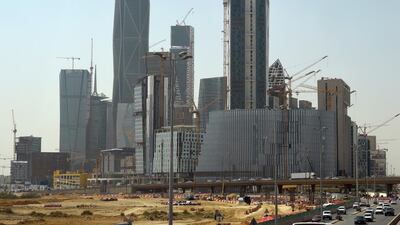Saudi Arabia’s government needs to move ahead with plans to design and implement project management offices (PMOs) to avoid further blockages in the country’s project pipeline, according to experts.
David Clifton, a business development director for cost and project management consultant Faithful+Gould, who was one of a number of consultants advising the Saudi government on the introduction of PMOs, told The National that “it is going to take a year just to design and start implementing this national project management office, whoever is going to do it”.
Only when this national project management office is in place can structures then be drawn up for a series of other PMOs through which individual ministries and municipalities will procure construction contracts, he said.
A royal decree announcing the introduction of PMOs was announced in September last year.
At about the same time, the kingdom’s government turned off the tap on new project awards, citing the need for greater control over public expenditure.
In an interview with Bloomberg in April, Mohammed Al Sheikh, an adviser to the deputy crown prince Mohammed Bin Salman, claimed that inefficient procurement had contributed to the Saudi government wasting between US$80 billion to $100bn per year.
Several international consultancies have been shortlisted as candidates to run the national PMO but no contract has been awarded yet.
Mr Clifton said that Saudi Arabia has about $1 trillion worth of projects in the pipeline, of which about 80 per cent are government funded.
He said he understood the reason for the delay in appointing someone to run the national PMO, stating that “no one has really tried to do anything this big before” but said that with no company currently in place, the market for new project awards in 2017 “looks slightly worse than this year, I would suggest”.
Faithful+Gould had predicted that $29.9bn worth of awards would be made in the Saudi market this year but these figures included the next phase of the Mecca Metro contract and the extension of the North-South rail link – neither of which have been awarded.
“If they don’t get signed off that will roll back to $22bn to $23bn. [Compare it] against 2012, when there was about $65bn to $70bn and that shows you what has happened to the market,” he said.
He said that outstanding contracts such as the Mecca and Jeddah metro projects, for which procurement is already under way, could be awarded as exceptions but said that most other major schemes would not be awarded until PMOs are in place.
Robert Ryan, the business development director for the Saudi Arabian arm of US infrastructure specialists Parsons, said that he expected the appointment of consultants for project management offices for individual ministries and municipalities to follow quickly after the national project management office is in place.
“Several ministries are beginning to issue RFPs [requests for proposals] for their own PMO contracts,” he said, pointing out that the ministry of municipal and rural affairs (MoMRA) issued its tender for PMO services earlier this month.
He said that all PMOs are likely to have to undertake an “audit” phase of existing projects, processes and standards before setting up their own structures. Only after this has completed are new projects likely to be progressed.
Richard Marshall, a senior infrastructure analyst with BMI Research, said that although the introduction of project management offices is unlikely to result in the cancellation of many of Saudi Arabia’s flagship projects, the process will lead to “delays in implementation and a scrapping of periphery projects”.
Yet Mr Ryan said that once the process is complete, it should lead to “greater accountability, faster project delivery, and overall improved quality” in the marketplace.
mfahy@thenational.ae
Follow The National's Business section on Twitter


